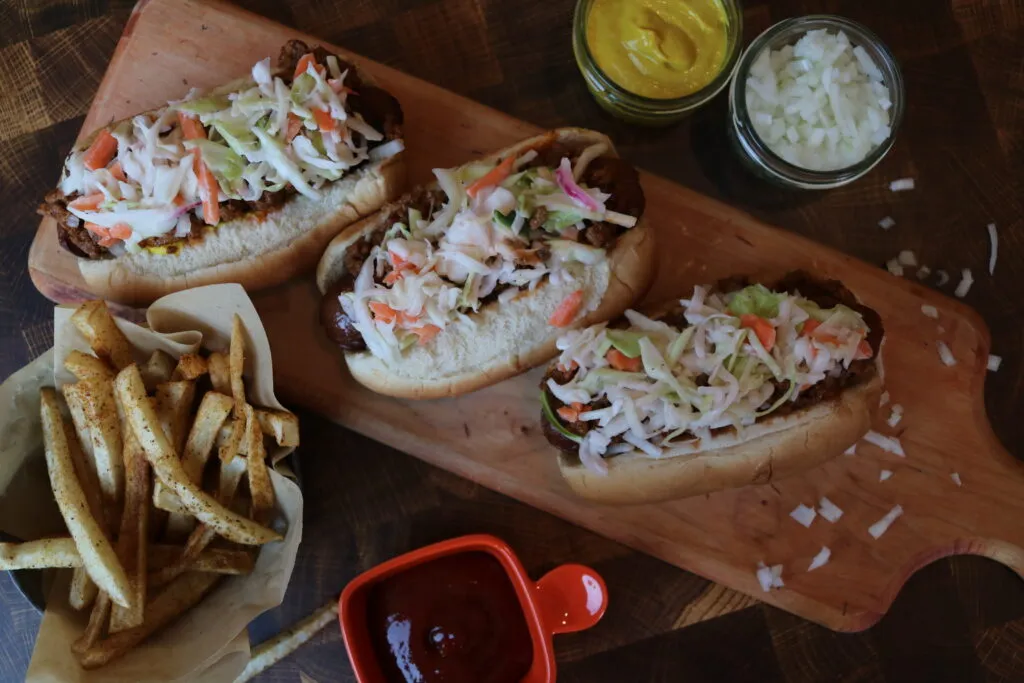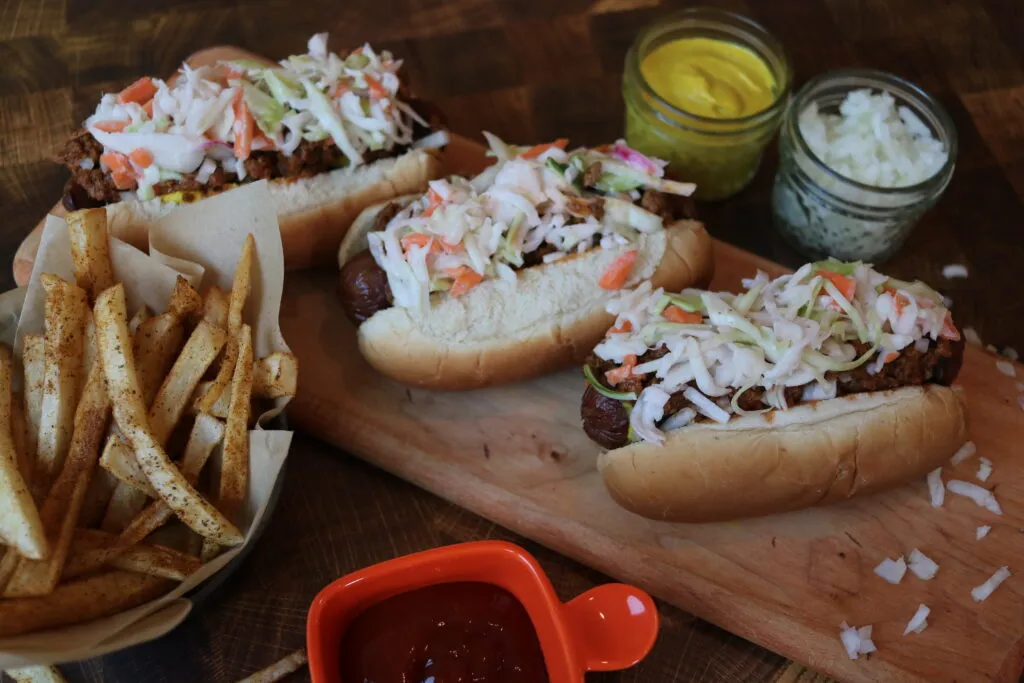The humble hot dog, a staple of backyard barbecues, sporting events, and regional culinary traditions like the West Virginia Slaw Dog, holds a special place in human comfort food. Its savory taste and satisfying texture make it an irresistible treat for many. However, for devoted pet parents, a common question arises when our furry friends gaze longingly at our plates: “Are hot dogs safe for dogs?” While sharing our food with our canine companions often feels like a loving gesture, it’s crucial to understand the potential risks associated with feeding human hot dogs to dogs. This article delves into why traditional hot dogs are generally not recommended for Hot Dog Dogs and offers safer alternatives to keep your pet healthy and happy.
The Allure of Hot Dogs (A Human Treat)
Imagine biting into a perfectly seared hot dog, nestled in a soft bun, topped with smoky chili, tangy coleslaw, and a squiggle of yellow mustard. This iconic Appalachian favorite, the West Virginia Slaw Dog, exemplifies how simple ingredients can create comfort food magic. The rich, meaty flavor of the hot dog itself, often made from beef or a blend of beef and pork, is undeniably appealing. Then come the toppings: a thick, savory chili (often without beans), a crunchy, vinegar-based slaw, and classic yellow mustard. For humans, it’s a delightful experience. But what makes this beloved item so problematic for our four-legged friends?
 A perfectly dressed West Virginia Slaw Dog in a bun with chili and coleslaw
A perfectly dressed West Virginia Slaw Dog in a bun with chili and coleslaw
The primary issue lies not just with the hot dog itself, but with its common preparation and ingredients. Most commercially produced hot dogs are designed for human palates, meaning they contain additives, seasonings, and levels of certain nutrients that are unsuitable for dogs. Understanding these components is key to protecting your dog’s health.
Hot Dogs for Dogs: A Closer Look at the Risks
When considering feeding hot dogs to hot dog dogs, pet parents must be aware of several critical concerns that can range from mild digestive upset to serious health issues.
High Sodium Content: A Hidden Danger
One of the most significant dangers of feeding hot dogs to dogs is their incredibly high sodium content. A single hot dog can contain a substantial portion of a human’s daily recommended sodium intake, let alone a dog’s. Excessive sodium can lead to serious problems for dogs, including:
- Increased Thirst and Urination: Dogs may drink excessive amounts of water and urinate more frequently.
- Sodium Ion Poisoning: In severe cases, consuming too much salt can lead to sodium ion poisoning, which can cause vomiting, diarrhea, tremors, seizures, and even death.
- Dehydration and Kidney Strain: High sodium intake can put a strain on a dog’s kidneys, potentially leading to or exacerbating kidney disease over time.
For more information on ingredients that are harmful, you might want to read about what are some things dogs cant eat.
Unhealthy Fats and Preservatives
Traditional hot dogs are often high in saturated fat. While dogs need some fat in their diet, excessive amounts of unhealthy fats can lead to:
- Obesity: Contributing to weight gain and associated health problems like joint issues and diabetes.
- Pancreatitis: A painful and potentially life-threatening inflammation of the pancreas, which can be triggered by high-fat meals.
- Digestive Upset: Diarrhea, vomiting, and stomach pain are common after dogs consume fatty foods.
Beyond fats, hot dogs typically contain preservatives like nitrates and nitrites. While these are approved for human consumption, their long-term effects on dogs, particularly in high doses, are not fully understood and are generally best avoided.
Choking Hazard: A Physical Threat
The cylindrical shape and chewy texture of hot dogs make them a significant choking hazard for dogs, especially smaller breeds or those who tend to gulp their food. A whole hot dog can easily become lodged in a dog’s throat, blocking their airway. Even sliced hot dogs can pose a risk if not cut into small, manageable pieces. If you must offer a tiny piece of hot dog (as a very rare treat and only after consulting your vet), it should always be cut lengthwise and then into small, coin-sized pieces.
Common Hot Dog Toppings & Their Dangers to Dogs
The classic “West Virginia Slaw Dog” comes with a variety of toppings, most of which are highly toxic or unhealthy for dogs:
- Chili: Many chili recipes, including the one for Slaw Dogs, contain onions and garlic. Both onions and garlic (even in powder form) are toxic to dogs and can cause red blood cell damage, leading to anemia. Spices like chili powder, smoked paprika, and cayenne pepper can also cause severe digestive upset.
- Coleslaw: While cabbage itself is generally safe in moderation, coleslaw typically contains mayonnaise (high in fat), sugar, salt, and sometimes other seasonings that are not good for dogs.
- Mustard: Yellow mustard often contains vinegar, salt, and spices that can cause gastrointestinal irritation in dogs.
Consider learning more about what food dogs can t have to keep your pet safe from common household dangers.
What if My Dog Ate a Hot Dog? Immediate Steps & Prevention
If your dog has accidentally eaten a hot dog or some hot dog pieces, don’t panic, but observe them closely.
- Monitor for Symptoms: Watch for signs of digestive upset like vomiting, diarrhea, lethargy, or loss of appetite.
- Choking Signs: If your dog is pawing at their mouth, coughing, gagging, or having difficulty breathing, they might be choking. Seek immediate veterinary attention.
- Contact Your Vet: It’s always best to call your veterinarian for advice, especially if your dog consumed a large amount, has underlying health conditions, or begins to show any concerning symptoms. They can provide guidance based on your dog’s size, health, and the amount consumed.
- Prevention is Key: To prevent future incidents, ensure hot dog dogs (meaning your actual dogs) do not have access to hot dogs or any human food that is unsafe. Keep hot dogs out of reach, secure trash cans, and educate family members about what your dog can and cannot eat.
 A close-up of a West Virginia Slaw Dog showing the chili and slaw
A close-up of a West Virginia Slaw Dog showing the chili and slaw
Safer Alternatives: Healthy Treats for Your Canine Companion
While the classic hot dog is off-limits for your dog, there are plenty of healthy and delicious human foods that are perfectly safe and beneficial for them. Instead of commercial hot dogs, consider these options:
- Lean, Cooked Meats: Plain, unseasoned cooked chicken, turkey, or lean beef (without bones) cut into small pieces can be a fantastic protein-rich treat. These are often considered what human foods are best for dogs.
- Fresh Vegetables: Carrots, green beans, peas, and cucumber slices are crunchy, low-calorie options.
- Fresh Fruits: Apple slices (without seeds), blueberries, and bananas in moderation make great sweet treats.
- Dog-Specific Treats: There are numerous commercially available dog treats designed to be healthy and safe for canine consumption, often shaped like small sausages or bites.
Always introduce new foods slowly and in small quantities to avoid digestive upset. For a comprehensive guide on what meats are suitable for your pet, check out our article on what meat is not good for dogs. Understanding what can dogs eat human food broadly will help you make better informed decisions about your pet’s diet.
Conclusion
While the aroma and appeal of a delicious hot dog might be tempting to share with your furry friend, it’s clear that traditional hot dog dogs (the food) pose several health risks to our beloved canine companions. High sodium levels, unhealthy fats, preservatives, and potentially toxic toppings like onions and garlic make hot dogs an unsuitable treat for pets. Furthermore, their shape presents a significant choking hazard. Prioritizing your dog’s health means opting for safe, dog-friendly alternatives and always consulting with your veterinarian if you have concerns about your dog’s diet. By making informed choices, you can ensure your dog enjoys a long, healthy, and happy life, free from the dangers of human junk food.
References
- American Kennel Club (AKC). “Can Dogs Eat Hot Dogs?” (Accessed: October 26, 2023).
- ASPCA. “People Foods to Avoid Feeding Your Pets.” (Accessed: October 26, 2023).
- PetMD. “Food Poisoning in Dogs.” (Accessed: October 26, 2023).
